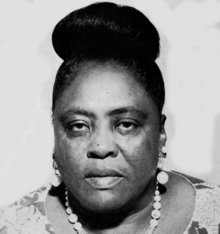Fannie Lou Hamer - Simple English Wikipedia, the free encyclopedia
Fannie Lou Hamer | |
|---|---|
 Hamer in 1971 | |
| Born | Fannie Lou Townsend October 6, 1917 |
| Died | March 14, 1977 (aged 59) Mound Bayou, Mississippi, U.S. |
| Burial place | Ruleville, Mississippi, U.S. |
| Organization(s) | National Women's Political Caucus Student Nonviolent Coordinating Committee National Council of Negro Women |
| Known for | Civil rights leader |
| Title | Vice chairwoman of Freedom Democratic Party; Co-founder of National Women's Political Caucus |
| Political party | Freedom Democratic Party |
| Movement | Civil rights movement Women's rights |
| Spouse | Perry "Pap" Hamer |
| Children | 2 |
| Awards | Inductee of the National Women's Hall of Fame |
Fannie Lou Hamer (/ˈheɪmər/; née Townsend; October 6, 1917 – March 14, 1977) was an influential American activist who fought for equal rights. Hamer protested for racial equality and reproductive rights in America. She is known for speaking for the African American group at an important national all-white meeting. Hamer was also a church singer. Her perseverance and rebellious spirit allowed her to help others, and make a long-lasting impact.
Activism
[change | change source]Hamer spent a large portion of her life working in the fields. She grew up on a farm. She married her husband in 1944,[1] and they found work at a nearby plantation.
In 1962,[1] Hamer learned that voting registration for Black Americans was possible. She immediately traveled to the nearest poll. However, she could not pass the literacy test.[1] It was made very difficult to keep Black Americans from being able to vote.[1] She soon returned home. She was fired from her job because she wanted to vote.[2] She continued to attempt registration. She was arrested. In prison, she was beaten. However, her confidence and perseverance gained nationwide attention.
In 1964, she co-founded the Mississippi Freedom Democratic Party (MFDP).[2] This organization challenged the local Democratic Party’s racist efforts.[2] In 1968, Hamer became an official member of Mississippi’s first delegation to have both White and Black Americans.[1] She organized many more operations and rallies in support of civil rights. Hamer traveled around the country, giving powerful speeches. In 1971,[1] Hamer helped to found the National Women’s Political Caucus.
Political progress was slow. Hamer became frustrated. She began doing economic work.[2] She began a “pig bank” to provide free pigs for Black farmers to breed, raise, and slaughter.[1] She later founded the Freedom Farm Cooperative (FFC).[1] Hamer purchased land that Black people could own and farm independently. Donors supported her so that she could buy more than 600 acres to build a store, a boutique, and a sewing factory.[1]
Home Life
[change | change source]Hamer grew up in Mississippi, USA. She was the youngest of twenty children. Their family was able to get a small amount of a land and a tractor. A white family was very upset that Hamer’s family had this. The white family killed their cattle. After this event, The Hamer family was even poorer than before. Later Hamer said in an interview, “Things got so tough I began to wish I was white.”[3] She also said that her mother got angry at her for saying that and her mother said “Don't ever, ever say that. You respect yourself as a little black child. And as you grow older, respect yourself as a black woman. Then one day, other people will respect you.”[3]Hamer told herself that she would “Do something for the black man of the South if it would cost her life.”[3]Later in Hamer’s life, she married Perry “Pap” Hamer. She adopted 4 children since she could not have any of her own.
Political Life
[change | change source]When Hamer was still working, she learned that voting registration for Black Americans was possible.[4] However, she could not pass the purposely-difficult literacy exam, and returned home. She was fired immediately upon return,[2] and had much of her property confiscated.
Hamer was angry and hoped to change the separated system. This hope led her to become a politician. During her political life, she was most well known for her work in the Student Nonviolent Coordinating Committee. While doing this job, Hamer fought for equality in voting. Hamer received the attention of the country for her position in the Mississippi Freedom Democratic Party. This helped black people to be elected to national offices in Mississippi. Henry Kirksey, a black representative in national offices, said "If Fannie Lou Hamer had had the same opportunities that Martin Luther King had, then we would have had a female Martin Luther King."[3]
References
[change | change source]- ↑ 1.0 1.1 1.2 1.3 1.4 1.5 1.6 1.7 1.8 "Fannie Lou Hamer". National Women's History Museum. Retrieved 2022-04-20.
- ↑ 2.0 2.1 2.2 2.3 2.4 Knapp, Maggie. "This Little Light of Mine: The Legacy of Fannie Lou Hamer." School Library Journal, vol. 62, no. 1, Jan. 2016, pp. 51+. Gale In Context.
- ↑ 3.0 3.1 3.2 3.3 "Fannie Lou Hamer". Gale Biography in Context. 1994. Retrieved May 3, 2018.
- ↑ "Fannie Lou Hamer". Biography. Retrieved 2022-04-20.


 French
French Deutsch
Deutsch